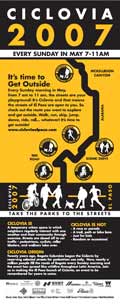
(Photo:Ethan Kent/Streetsblog)
Hoping to emulate the overwhelming success of “ciclovias” in many South American countries, PDOT hopes to bring the concept — which they call “Sunday Parkways” — to Portland by next year.
A ciclovia consists of the temporary or permanent closure of a major street (or streets) to motorized vehicles so that people are free to use the roadway without concern for their safety.
For the past few months, I’ve heard rumors from within PDOT that they were looking into a ciclovia-type event, so I asked PDOT’s Transportation Options Division manager Linda Ginenthal for the lowdown.
Here’s what she said:
“Sunday Parkways is an idea that Transportation Options is looking at trying as part of the International Car Free Conference in June 2008…
 Flyer for El Paso’s Ciclovia.
Flyer for El Paso’s Ciclovia.
Click to enlargeOptions is looking at possible routes in north and northeast Portland and we’re beginning to have conversations with area neighborhoods and community groups to see how this could work.
We know that this will take lots of volunteers and strong community support to get off the ground. Stay tuned…”
Bogota is credited with creating ciclovias back in the 1970s and the concept has spread like wildfire. The Bogota event has been known to attract 2 million people in one day and similar successes are taking place in Mexico, Barcelona and other countries.
The United States (not surprisingly) is late to the ciclovia party. El Paso, Texas is currently the only city with a regular ciclovia event. The Chicagoland Bicycle Federation is working on their version which they’ve coined “Streets for People“.
One barrier to making this happen might be the logistics and costs involved in coordinating the many volunteers and police personnel that will be required at intersections. And that’s probably just one of many things that will make this a tricky event to pull off (I can also foresee potential political and bureaucratic obstacles).
But no matter the barriers, this is about community, health and access to public spaces. If it can happen anywhere, it can (should) happen here.

